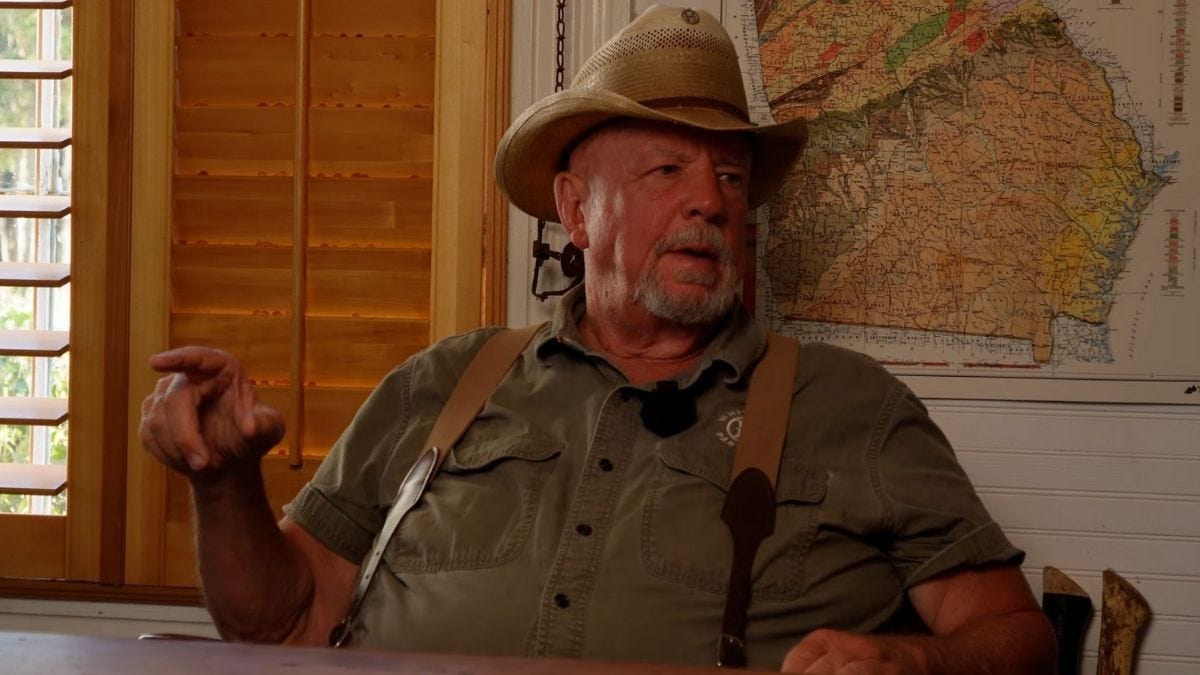Balance, Extinction, and the Human Dilemma: Lessons from Will Harris of White Oak Pastures
How one Georgia cattleman turned away from chemicals, rebuilt his soil, and revived an entire town — proving regeneration heals more than land.

When I first sat down with Will Harris inside what used to be the courthouse of Bluffton, Georgia (now the headquarters of White Oak Pastures) I knew I wasn’t just talking to a farmer. I was talking to a man who’d outlasted industrial agriculture’s entire life cycle: the rise, the rot, and the return.
The walls around us still whispered that history, four generations’ worth of hands that had lived through every era of American farming. Will’s great-grandfather started here after the Civil War. His father industrialized it. And Will? He broke the spell.
From Killing to Cultivating
“I fancied myself as being really good at spotting problems,” Will told me.
“I’d go to the pasture every day looking for something to kill… weeds, pests, worms, whatever. But eventually I realized I was creating as many problems as I was solving.”
That’s when it clicked for him, farming wasn’t supposed to be a war. Every time he “cured” something with chemicals, another issue took its place. So he began to ask a different question: What if the problem isn’t the pest, but the imbalance?
Today, when you walk White Oak Pastures, you don’t see the sterilized rows or scorched fields of industrial farming. You see life, layers of it. Cows, chickens, flies, and fungi all existing in a kind of organized chaos.
“I don’t have to know what every species does,” Will said. “I just know they belong here.” That’s the shift, from control to collaboration. From science as weapon to science as observation.
Rebuilding a Town by Regenerating a Farm
When Will transitioned the farm from monoculture cattle to a fully regenerative, vertically integrated operation, he wasn’t just rebuilding soil, he was rebuilding Bluffton itself.
“When I changed the way I farmed,” he told me, “I went from four minimum-wage employees to 170 people who make over $100,000 a week combined. That changed everything.”
What started as one man’s attempt to heal his land turned into a small-town renaissance.
Bluffton had been hollowed out by Big Ag’s consolidation, no mills, no factories, no industry left. But by re-localizing the food system, Will did what no government grant or NGO ever could: he brought back community wealth.
Every Friday, White Oak Pastures cuts a payroll north of $100,000, real money that circulates right back into town. “We didn’t do it with a budget or a plan to save Bluffton,” Will said. “We just fixed what needed fixing.”
The Courage to Be Wrong
When I asked him what advice he gives new farmers, he laughed.
“I tell them not to be afraid to be wrong. Most people can’t admit when they mess up. But if you can’t do that, you’ll never learn.”
That humility (the willingness to adapt) is rare in any industry, but it’s vital in agriculture. Will says he’s proud of how many things he’s stopped doing. He tried to plant cool-season perennials in South Georgia for years before realizing the land simply wasn’t made for them. Instead, he found a way to thrive with cool-season annuals like rye, radish, and clover… and turned failure into function.
That’s the deeper lesson here: nature isn’t broken, our perspective is. The more we fight her, the more she humbles us. The more we listen, the more she teaches.
The Long View: Generational Stewardship
Industrial agriculture measures success by the quarter.
Regenerative agriculture measures it by the century.
Will’s family has worked this land since 1866. He’s 70 now, and his two daughters (both back on the farm) are carrying the torch. “We make decisions a CPA would hate,” he told me. “Because we’re not thinking about this year’s return. We’re thinking about 40 years from now.”
That’s the contrast between the factory mindset and the farming mindset. The factory asks: How fast can I grow this? The farmer asks: Will this still be here for my grandkids?
What White Oak Pastures Teaches Us About Balance
Spending the day with Will reminded me why I started The Regenaissance in the first place. It’s not about romanticizing the past — it’s about learning from it.
We live in a culture obsessed with fixes… quick, linear, and scalable. But farming, like life, is cyclical. It’s about rhythm, humility, and observation. It’s about staying close enough to the land to see what it’s telling you.
Thank you for reading, Viva La Regenaissance!
-Ryan Griggs, The Regenaissance Founder
Watch the Full Podcast: White Oak Pastures with Will Harris
Step inside Bluffton’s reborn ecosystem and see how regenerative farming can revive not just soil, but entire communities.

